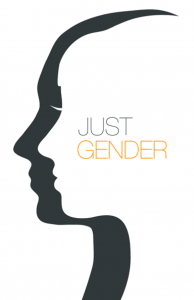 Just Gender. Dir. George Zuber. Buddha Dog Productions, LLC. 2013. 96 min.
Just Gender. Dir. George Zuber. Buddha Dog Productions, LLC. 2013. 96 min.
The documentary Just Gender is poised to be a vital component in the significant efforts to educate both the mainstream public and those who identify as LGBT about historical and contemporary transgender issues. The film does not shy away from hard, often brutal truths about transphobia, cisgender privilege, and the long road we, as a global community, are staring down before we can claim to be a just society. With impressive and laudable deftness, Just Gender balances the necessity to educate the viewer about transgender concerns and terminology didactically, with a commitment to presenting trans people telling their unique stories. It’s hard to imagine anyone viewing it and not learning a great deal.
The film seeks to inform the viewer very early on about the diversity among those who identify as “transgender,” delving into the myriad labels that might apply and the distinctions between them. The film acknowledges that its primer on trans labels is quite broad, but Just Gender will be useful, even crucial, to the vast majority of viewers. The filmmakers understand that the majority of the public is likely quite ignorant of most of these issues and that understanding is essential to the success of this film as an educational tool. Highly informed viewers might find these early sections to be too elementary, but they’re not the viewers with the most to gain from seeing this documentary.
The film’s opening scene is, in all honesty, quite jarring. A trans woman tells of her cruel and utter rejection by her family as an adolescent and the arduous life she faced as a direct result. Her story is so melancholy that it becomes hard not to mentally brace one’s self for an exceedingly difficult viewing experience. Most of the film focuses heavily on the hardships, persecution, and complexities that come with being transgender in America.
Only in its brief final chapter does the film explore the positive aspects such as experiencing the joy of self-understanding and self-acceptance, finding a community of people going through the same thing, and finding romantic fulfillment. The trans woman from the film’s beginning provides a nice bookend: her life has turned around, her familial relationships are being repaired, and she is finding professional success. Because this more positively-themed discussion doesn’t happen until the film is nearly over, the negative focus makes for an uncomfortable experience at times. This may be the filmmakers’ intention, an effective method to jolt the viewer out of complacency and passivity.
Issues surrounding transgender people are so generally misunderstood and complex that it’s easy to recommend this film be shown widely and often. However, the rough subject matter and presence of transphobic slurs (in acceptable context) make this a film more easily recommended to those of high school age and above. Hopefully, Just Gender will have the same impact of a film like Paris is Burning — opening the viewers’ eyes to a world and set of experiences they had previously ignored and perhaps didn’t know existed. By educating the viewer and by creating such strong empathy with the interviewees, this film can help to create positive change in our society.
While the majority of the film focuses on the grim realities and bleak experiences that transgender people have faced, Just Gender is important, highly enlightening viewing, and well worth soldiering through the parts that are more difficult to watch.
Michael Mungin
Psychology Librarian, James Madison University